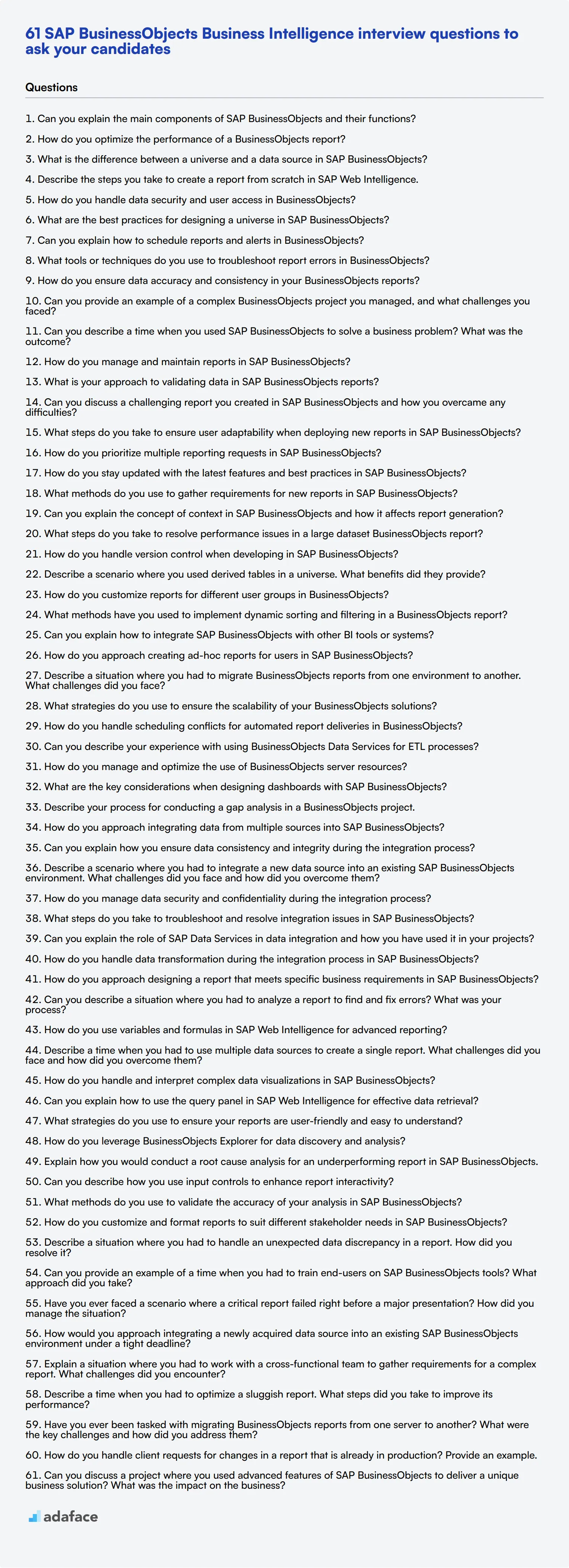Finding the right SAP BusinessObjects Business Intelligence (BI) professionals can be quite challenging. When screening candidates, having a targeted list of interview questions is invaluable for assessing their technical skills and experience.
In this blog post, we provide a comprehensive list of interview questions for recruiters and hiring managers. This guide covers questions suited for junior and mid-tier analysts, as well as specialized questions about data integration, reporting, and situational scenarios.
Using these questions, you can identify top candidates who truly understand SAP BusinessObjects BI. For a more thorough initial assessment, consider using a SAP BI online test before the interview.
Table of contents
10 common SAP BusinessObjects Business Intelligence interview questions to ask your candidates
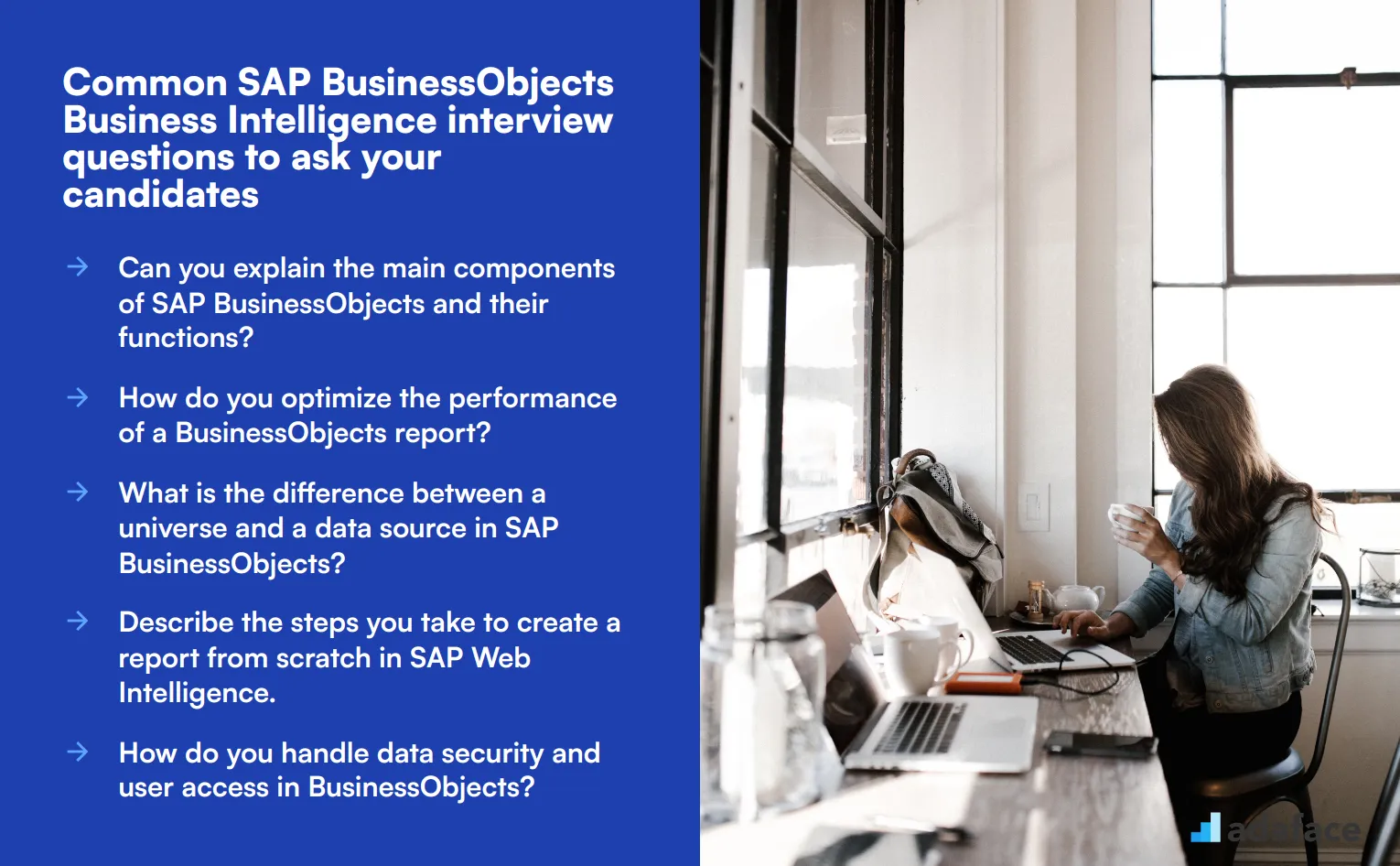
To ensure your candidates possess the necessary skills and knowledge for SAP BusinessObjects Business Intelligence roles, use this list of interview questions during your hiring process. These questions will help you assess their technical understanding and practical experience relevant to the job, enabling you to find the right fit for your team. For more insights on job roles, check out this Business Intelligence Developer job description.
- Can you explain the main components of SAP BusinessObjects and their functions?
- How do you optimize the performance of a BusinessObjects report?
- What is the difference between a universe and a data source in SAP BusinessObjects?
- Describe the steps you take to create a report from scratch in SAP Web Intelligence.
- How do you handle data security and user access in BusinessObjects?
- What are the best practices for designing a universe in SAP BusinessObjects?
- Can you explain how to schedule reports and alerts in BusinessObjects?
- What tools or techniques do you use to troubleshoot report errors in BusinessObjects?
- How do you ensure data accuracy and consistency in your BusinessObjects reports?
- Can you provide an example of a complex BusinessObjects project you managed, and what challenges you faced?
8 SAP BusinessObjects Business Intelligence interview questions and answers to evaluate junior analysts
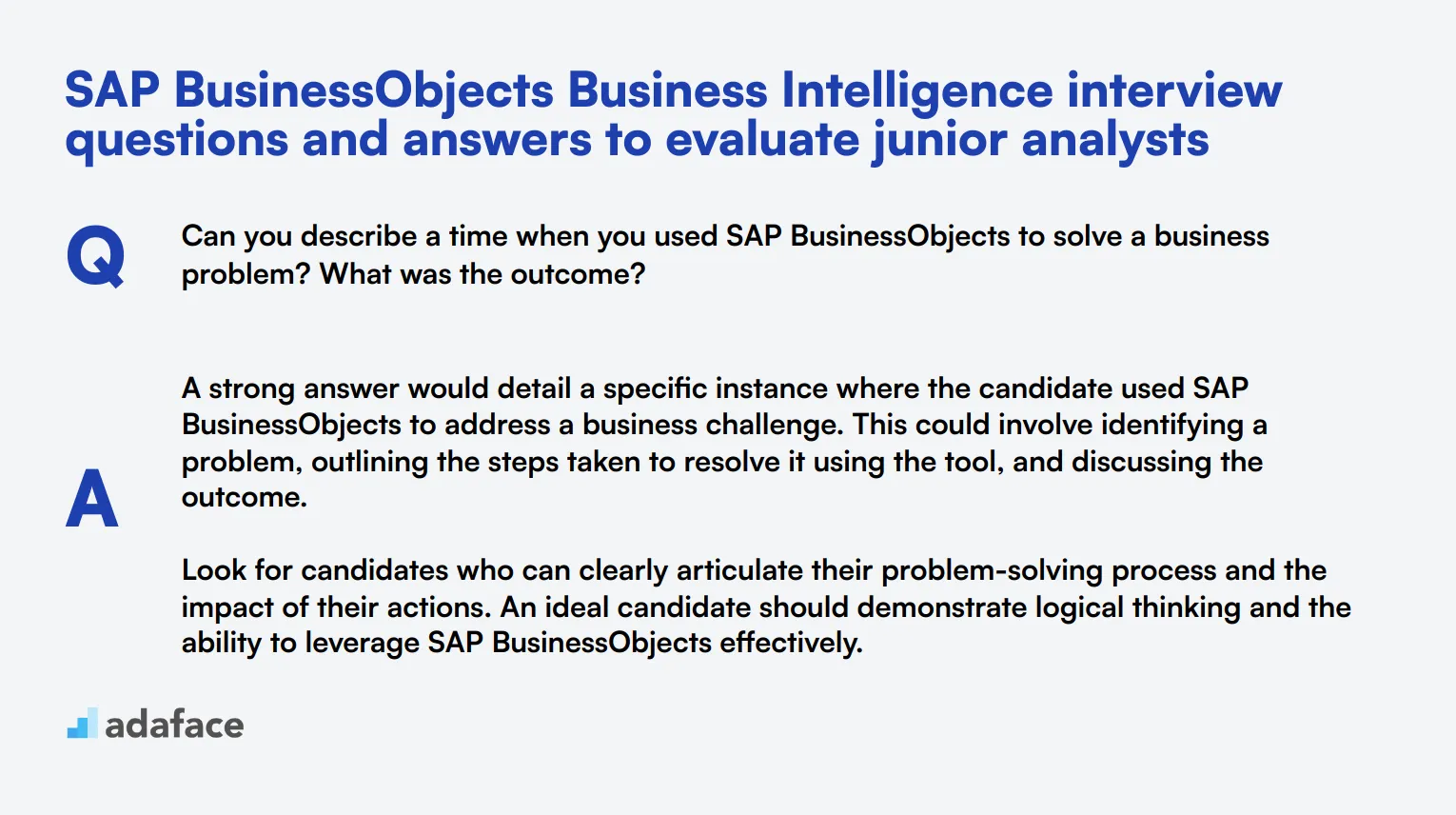
To gauge whether your junior analysts have a solid grasp of SAP BusinessObjects Business Intelligence, use these 8 interview questions. These queries are designed to assess their practical knowledge and problem-solving skills in real-world scenarios.
1. Can you describe a time when you used SAP BusinessObjects to solve a business problem? What was the outcome?
A strong answer would detail a specific instance where the candidate used SAP BusinessObjects to address a business challenge. This could involve identifying a problem, outlining the steps taken to resolve it using the tool, and discussing the outcome.
Look for candidates who can clearly articulate their problem-solving process and the impact of their actions. An ideal candidate should demonstrate logical thinking and the ability to leverage SAP BusinessObjects effectively.
2. How do you manage and maintain reports in SAP BusinessObjects?
Candidates should explain their process for managing and maintaining reports. This might include scheduling reports, updating them to reflect changes in data or requirements, and ensuring they are distributed to the right stakeholders.
An ideal answer should indicate the candidate's attention to detail, organizational skills, and understanding of the importance of accurate and timely reporting.
3. What is your approach to validating data in SAP BusinessObjects reports?
The candidate should discuss steps they take to ensure data accuracy, such as cross-checking with source data, using validation checks, and peer reviews.
A strong response will highlight the candidate's commitment to data integrity and their methods for preventing errors in reports. Look for thoroughness and a structured approach to validation.
4. Can you discuss a challenging report you created in SAP BusinessObjects and how you overcame any difficulties?
A candidate might describe a complex report, the challenges faced (such as data integration or complex calculations), and how they resolved these issues.
Look for problem-solving skills, perseverance, and creativity in handling complex reporting requirements. Their answer should demonstrate resilience and a proactive approach to troubleshooting.
5. What steps do you take to ensure user adaptability when deploying new reports in SAP BusinessObjects?
Candidates should mention training sessions, user manuals, and ongoing support as part of their strategy to ensure users can adapt to new reports.
An ideal answer will show the candidate's ability to anticipate user needs and their commitment to making tools user-friendly. Look for evidence of effective communication and training skills.
6. How do you prioritize multiple reporting requests in SAP BusinessObjects?
Candidates should discuss their approach to prioritizing tasks, such as assessing urgency, business impact, and resource availability.
Look for responses that demonstrate strong organizational skills and the ability to manage time effectively. An ideal candidate should be able to balance competing demands while maintaining high-quality output.
7. How do you stay updated with the latest features and best practices in SAP BusinessObjects?
Candidates might mention attending training sessions, participating in online forums, and reading relevant blogs or documentation.
A strong candidate will show a commitment to continuous learning and professional growth. They should be proactive in keeping their skills and knowledge current to leverage the full capabilities of SAP BusinessObjects.
8. What methods do you use to gather requirements for new reports in SAP BusinessObjects?
Candidates should describe their approach to gathering requirements, which might include stakeholder interviews, workshops, and reviewing existing documentation.
An ideal response will demonstrate effective communication skills and the ability to translate business needs into technical specifications. Look for thoroughness in understanding user requirements and ensuring alignment with business objectives.
15 intermediate SAP BusinessObjects Business Intelligence interview questions and answers to ask mid-tier analysts
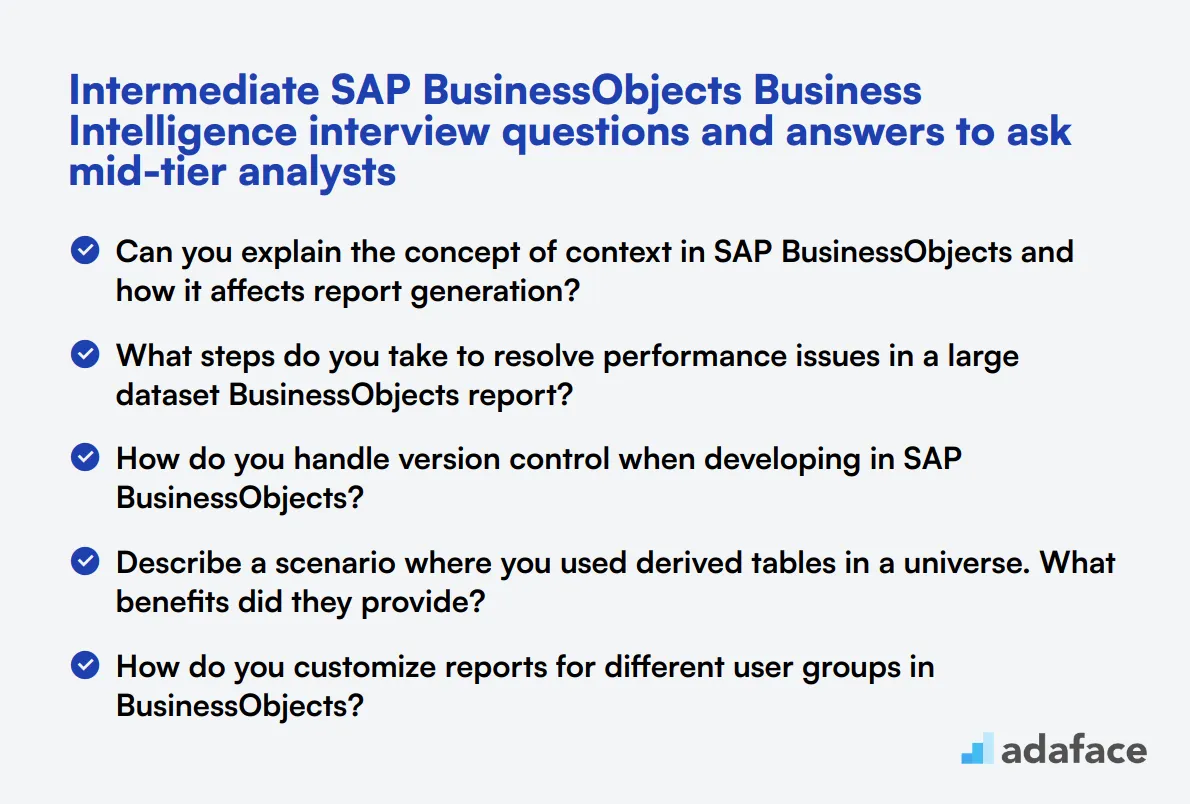
To determine whether your applicants have the right skills to handle intermediate-level tasks in SAP BusinessObjects, consider using some of these interview questions. They are designed to assess a candidate's proficiency and practical experience, ensuring you select the most qualified mid-tier analysts for your team. For more insights on identifying the right talent, you might explore the business intelligence analyst job description.
- Can you explain the concept of context in SAP BusinessObjects and how it affects report generation?
- What steps do you take to resolve performance issues in a large dataset BusinessObjects report?
- How do you handle version control when developing in SAP BusinessObjects?
- Describe a scenario where you used derived tables in a universe. What benefits did they provide?
- How do you customize reports for different user groups in BusinessObjects?
- What methods have you used to implement dynamic sorting and filtering in a BusinessObjects report?
- Can you explain how to integrate SAP BusinessObjects with other BI tools or systems?
- How do you approach creating ad-hoc reports for users in SAP BusinessObjects?
- Describe a situation where you had to migrate BusinessObjects reports from one environment to another. What challenges did you face?
- What strategies do you use to ensure the scalability of your BusinessObjects solutions?
- How do you handle scheduling conflicts for automated report deliveries in BusinessObjects?
- Can you describe your experience with using BusinessObjects Data Services for ETL processes?
- How do you manage and optimize the use of BusinessObjects server resources?
- What are the key considerations when designing dashboards with SAP BusinessObjects?
- Describe your process for conducting a gap analysis in a BusinessObjects project.
7 SAP BusinessObjects Business Intelligence interview questions and answers related to data integration
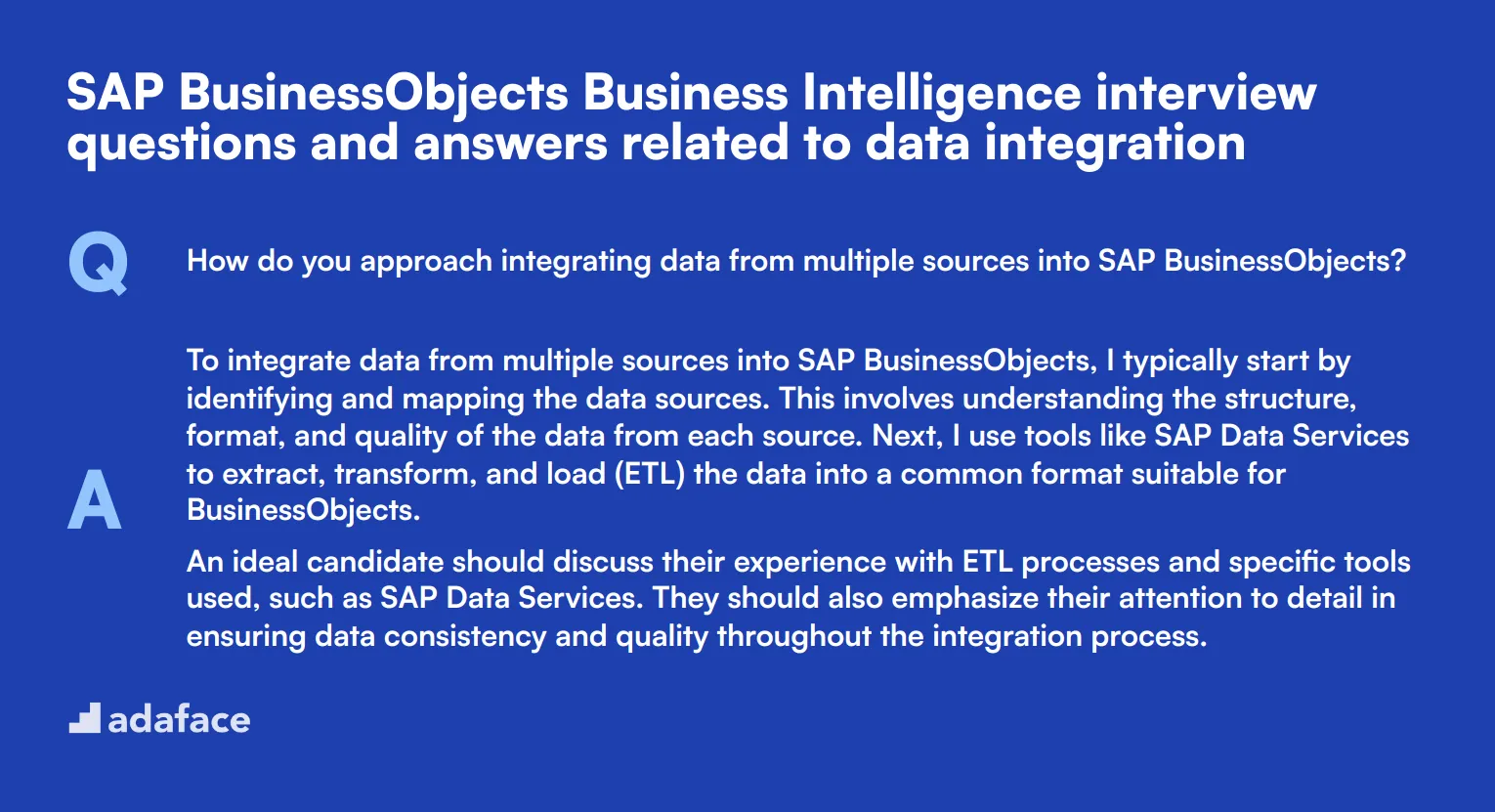
To assess whether your candidates can effectively integrate data using SAP BusinessObjects Business Intelligence, use these targeted interview questions. This list is designed to reveal their practical skills and understanding, ensuring you make the right hire for your organization.
1. How do you approach integrating data from multiple sources into SAP BusinessObjects?
To integrate data from multiple sources into SAP BusinessObjects, I typically start by identifying and mapping the data sources. This involves understanding the structure, format, and quality of the data from each source. Next, I use tools like SAP Data Services to extract, transform, and load (ETL) the data into a common format suitable for BusinessObjects.
An ideal candidate should discuss their experience with ETL processes and specific tools used, such as SAP Data Services. They should also emphasize their attention to detail in ensuring data consistency and quality throughout the integration process.
2. Can you explain how you ensure data consistency and integrity during the integration process?
Ensuring data consistency and integrity is crucial during the integration process. I accomplish this by implementing data validation rules and checks at various stages of the ETL process. For example, I validate data types, ranges, and relationships to ensure they conform to the required standards before and after loading into the target system. Additionally, I use data profiling tools to identify and rectify any inconsistencies or anomalies.
Look for candidates who mention specific techniques and tools they use for data validation and profiling. Their answers should reflect a proactive approach to maintaining data integrity, including handling exceptions and logging issues for further investigation.
3. Describe a scenario where you had to integrate a new data source into an existing SAP BusinessObjects environment. What challenges did you face and how did you overcome them?
In one of my previous projects, I had to integrate a new CRM system into our existing SAP BusinessObjects environment. The main challenges were data format differences and ensuring real-time data updates. To address these, I designed a comprehensive ETL process using SAP Data Services, which included data transformation scripts to standardize the formats. For real-time updates, I implemented a combination of batch processing and real-time data integration techniques.
A strong response should detail the specific challenges faced and the methods used to overcome them. It’s important to assess their problem-solving skills and how they handle unexpected issues during the integration process.
4. How do you manage data security and confidentiality during the integration process?
Data security and confidentiality are paramount when integrating data. I ensure this by implementing robust access controls and encryption methods. During the ETL process, sensitive data is encrypted both in transit and at rest. Additionally, I follow best practices for user access management, ensuring only authorized personnel can access sensitive information. Regular audits and monitoring help maintain compliance with data protection regulations.
Ideal candidates should demonstrate a clear understanding of data security practices and regulations. Look for their experience with encryption, access controls, and compliance with standards such as GDPR or HIPAA.
5. What steps do you take to troubleshoot and resolve integration issues in SAP BusinessObjects?
When troubleshooting integration issues in SAP BusinessObjects, I first identify the root cause by examining error logs and data flow diagrams. Common steps include checking connectivity between source and target systems, validating data transformation rules, and ensuring no data quality issues. I use debugging tools provided by SAP Data Services and collaborate with other team members to resolve complex issues.
Look for candidates who can systematically approach problem-solving and have experience using specific tools for troubleshooting. Their ability to work collaboratively to resolve issues is also a key factor to consider.
6. Can you explain the role of SAP Data Services in data integration and how you have used it in your projects?
SAP Data Services plays a crucial role in data integration by providing a comprehensive ETL toolset for extracting, transforming, and loading data from various sources into target systems. In my projects, I have used SAP Data Services to integrate data from databases, flat files, and cloud sources. The tool's data cleansing and transformation capabilities ensure that the data is accurate and consistent before loading it into SAP BusinessObjects.
Candidates should highlight their hands-on experience with SAP Data Services, discussing specific features they have utilized. Their ability to leverage the tool’s capabilities to address complex data integration scenarios is essential.
7. How do you handle data transformation during the integration process in SAP BusinessObjects?
Data transformation is a critical step in the integration process, and I handle it by defining transformation rules that convert source data into the desired format for SAP BusinessObjects. This involves data cleansing, normalization, and enrichment to ensure data quality. I use SAP Data Services to create transformation workflows that automate these processes, ensuring consistency and reducing manual errors.
A good candidate will discuss their approach to defining and implementing transformation rules. They should also mention their experience with automation tools to streamline the process and ensure data quality.
12 SAP BusinessObjects Business Intelligence interview questions about reporting and analysis
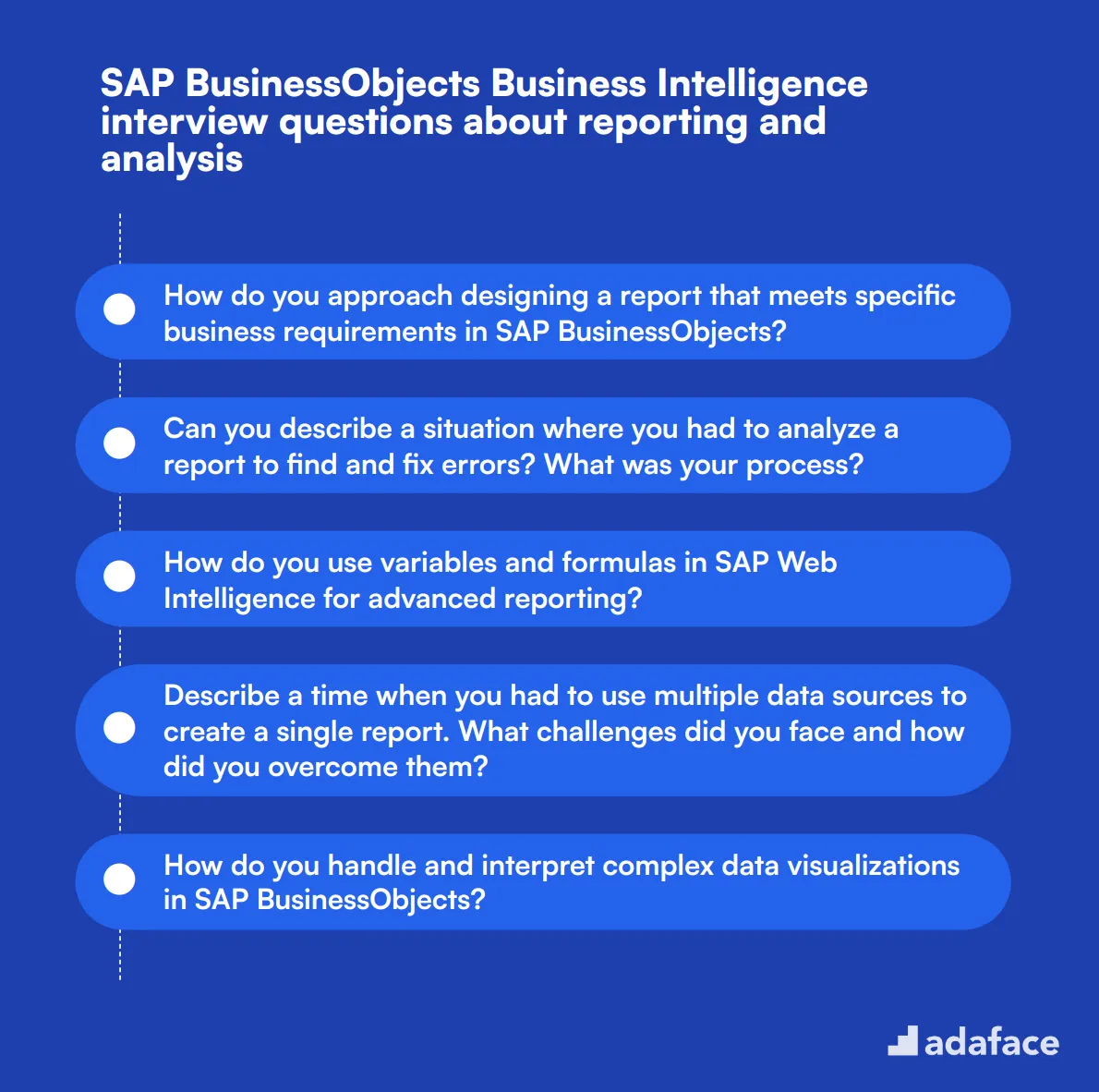
To determine whether your applicants have the right skills for reporting and analysis in SAP BusinessObjects, ask them some of these 12 interview questions. These questions will help you gauge their practical knowledge and problem-solving abilities, ensuring you choose the best fit for your team. For additional insights into related roles, check out this business intelligence developer job description.
- How do you approach designing a report that meets specific business requirements in SAP BusinessObjects?
- Can you describe a situation where you had to analyze a report to find and fix errors? What was your process?
- How do you use variables and formulas in SAP Web Intelligence for advanced reporting?
- Describe a time when you had to use multiple data sources to create a single report. What challenges did you face and how did you overcome them?
- How do you handle and interpret complex data visualizations in SAP BusinessObjects?
- Can you explain how to use the query panel in SAP Web Intelligence for effective data retrieval?
- What strategies do you use to ensure your reports are user-friendly and easy to understand?
- How do you leverage BusinessObjects Explorer for data discovery and analysis?
- Explain how you would conduct a root cause analysis for an underperforming report in SAP BusinessObjects.
- Can you describe how you use input controls to enhance report interactivity?
- What methods do you use to validate the accuracy of your analysis in SAP BusinessObjects?
- How do you customize and format reports to suit different stakeholder needs in SAP BusinessObjects?
9 situational SAP BusinessObjects Business Intelligence interview questions for hiring top analysts
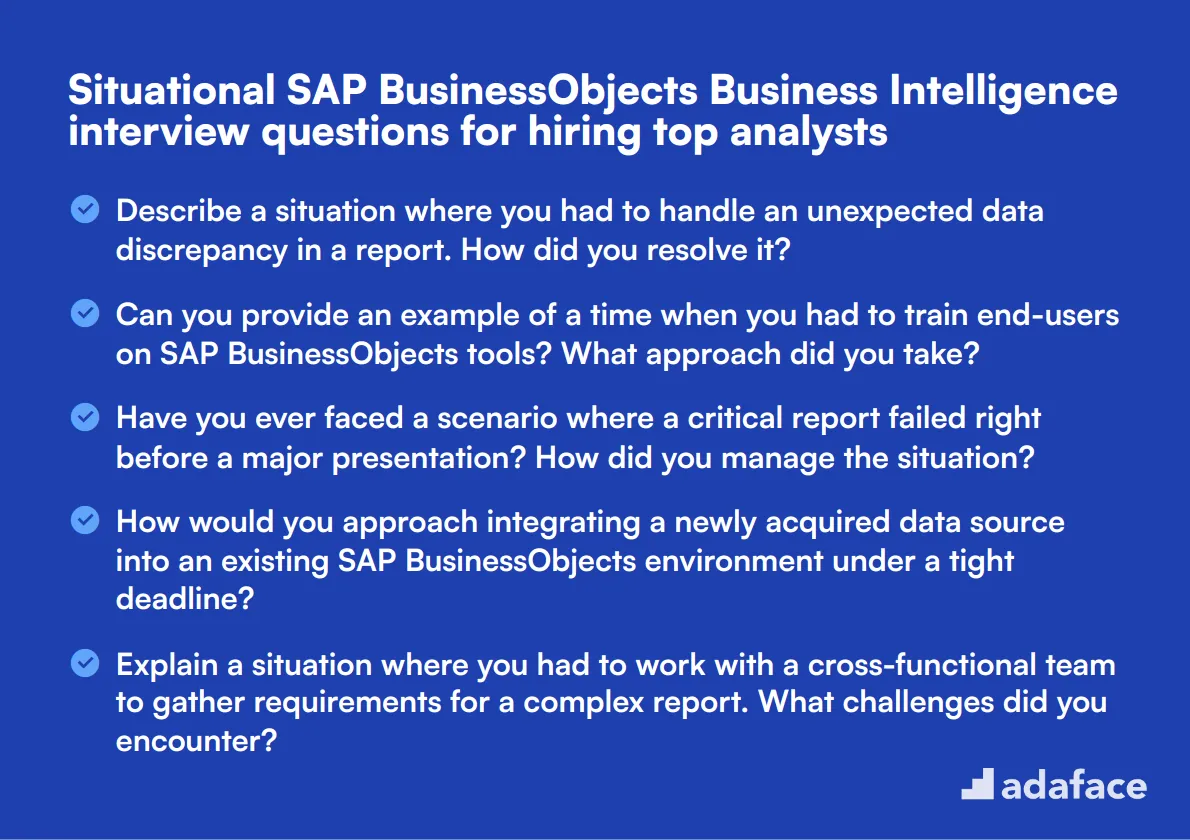
To determine whether your applicants have the right skills to handle complex tasks in SAP BusinessObjects Business Intelligence, ask them some of these situational interview questions. These questions will help you gauge their practical experience and problem-solving abilities, ensuring you hire top analysts for your team. For more details on what to look for in a business intelligence analyst, refer to this guide.
- Describe a situation where you had to handle an unexpected data discrepancy in a report. How did you resolve it?
- Can you provide an example of a time when you had to train end-users on SAP BusinessObjects tools? What approach did you take?
- Have you ever faced a scenario where a critical report failed right before a major presentation? How did you manage the situation?
- How would you approach integrating a newly acquired data source into an existing SAP BusinessObjects environment under a tight deadline?
- Explain a situation where you had to work with a cross-functional team to gather requirements for a complex report. What challenges did you encounter?
- Describe a time when you had to optimize a sluggish report. What steps did you take to improve its performance?
- Have you ever been tasked with migrating BusinessObjects reports from one server to another? What were the key challenges and how did you address them?
- How do you handle client requests for changes in a report that is already in production? Provide an example.
- Can you discuss a project where you used advanced features of SAP BusinessObjects to deliver a unique business solution? What was the impact on the business?
Which SAP BusinessObjects Business Intelligence skills should you evaluate during the interview phase?
While it's challenging to assess every aspect of a candidate's SAP BusinessObjects Business Intelligence expertise in a single interview, focusing on core skills is crucial. The following key areas are essential to evaluate during the interview process to ensure you're selecting the right talent for your team.
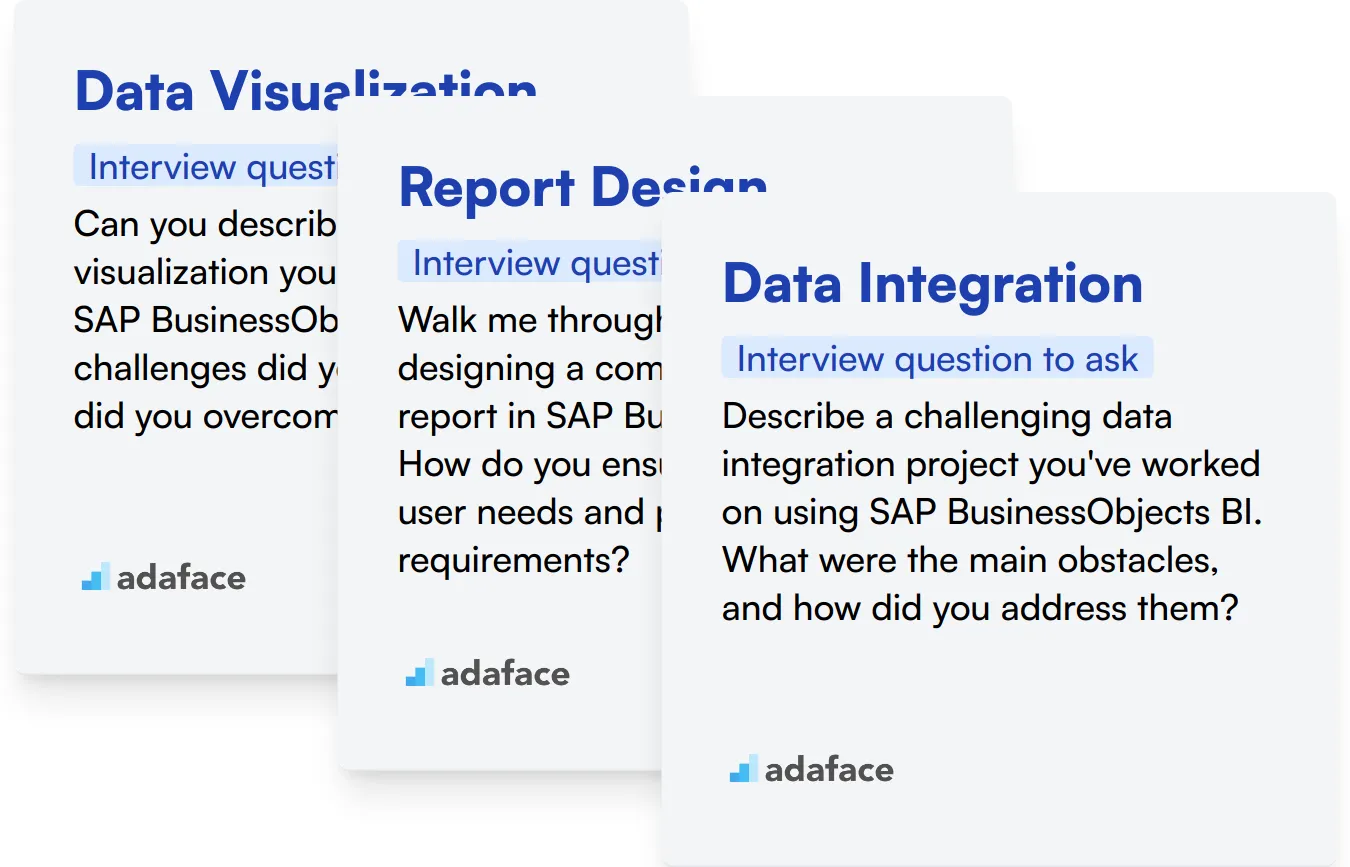
Data Visualization
Data visualization is a cornerstone of SAP BusinessObjects BI. It enables users to transform complex data into easily understandable visual representations, facilitating better decision-making across an organization.
To assess this skill, consider using an assessment test that includes multiple-choice questions on various chart types, best practices for data presentation, and scenario-based problems.
You can also ask targeted interview questions to gauge the candidate's proficiency in data visualization. Here's an example:
Can you describe a complex data visualization you've created using SAP BusinessObjects BI? What challenges did you face, and how did you overcome them?
Look for answers that demonstrate the candidate's ability to select appropriate visualization types, handle large datasets, and create clear, impactful visualizations. Pay attention to their problem-solving approach and how they balanced technical and design considerations.
Report Design
Effective report design is critical in SAP BusinessObjects BI. It involves creating user-friendly reports that deliver actionable insights while adhering to best practices in data presentation and organization.
To evaluate a candidate's report design skills, consider asking this question:
Walk me through your process for designing a complex, multi-page report in SAP BusinessObjects BI. How do you ensure it meets both user needs and performance requirements?
Listen for responses that cover requirements gathering, data source selection, layout planning, and performance optimization. The candidate should demonstrate an understanding of user experience principles and how to balance information density with readability.
Data Integration
Data integration is fundamental in SAP BusinessObjects BI environments. It involves combining data from various sources to create a unified view, enabling comprehensive analysis and reporting.
To assess a candidate's data integration skills, you might ask:
Describe a challenging data integration project you've worked on using SAP BusinessObjects BI. What were the main obstacles, and how did you address them?
Look for answers that showcase the candidate's ability to work with diverse data sources, handle data quality issues, and implement efficient ETL processes. Pay attention to their problem-solving skills and knowledge of SAP BusinessObjects BI's data integration capabilities.
Hire top talent with SAP BusinessObjects skills tests and the right interview questions
When hiring for positions requiring SAP BusinessObjects skills, it's important to ensure candidates truly possess these abilities. This helps you avoid potential mismatches and ensures a smoother onboarding process.
The most accurate way to assess these skills is through dedicated skill tests. Consider using our SAP BI online test to evaluate candidates effectively.
Once the tests are completed, you can easily shortlist the best applicants for interviews. This step significantly streamlines your hiring process and helps you focus on the right candidates.
To get started, visit our test library to explore various assessments. Sign up today and enhance your hiring strategy with tailored skill tests.
SAP BI Test
Download SAP BusinessObjects Business Intelligence interview questions template in multiple formats
SAP BusinessObjects Business Intelligence Interview Questions FAQs
Look for a strong understanding of data analysis, reporting, data integration, and experience with SAP BusinessObjects tools.
These questions help assess a candidate's technical knowledge, problem-solving skills, and practical experience with SAP BusinessObjects.
Yes, the list includes questions for junior, mid-tier, and top analysts, covering various aspects of SAP BusinessObjects Business Intelligence.
Absolutely! These questions are designed to assess skills and knowledge and can be effectively used in remote interviews.
Yes, combining technical and situational questions provides a more comprehensive evaluation of a candidate’s abilities and problem-solving skills.
Data integration is crucial for ensuring accurate and seamless data flow, making it essential to evaluate candidates' skills in this area.

40 min skill tests.
No trick questions.
Accurate shortlisting.
We make it easy for you to find the best candidates in your pipeline with a 40 min skills test.
Try for freeRelated posts
Free resources




